The web services summit doesn't begin until this afternoon. This morning's event is a venture capital conference hosted by Cadence and the State of Utah. The idea is to showcase Utah companies in front of some valley VCs. Cadence has a recent Utah presence in Sandy. There are about 90 Cadence employees in Utah right now and that number is expected to grow to 200 within 18 months. Ray Bingham, the CEO of Cadence has Utah roots. He was born in Heber UT and graduated from Weber State University. Even so, Ray maintains that Utah competed on its own merits and beat out over 100 other sites.

|
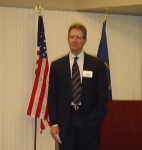
|
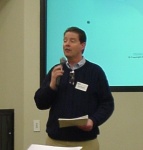
|
| Mike Leavitt | Ray Bingham | Brad Bertoch |
The keynote is being given by Governor Leavitt. Governor Leavitt knows about convening power and he uses it well in events like this. The Governor's message is the familiar one: Utah has a workforce is growing at twice the national average, the workforce is well educated, there are outstanding recreational opportunities (quality of life) and Utah is 1.5 hours from Silicon Valley. He characterizes Utah as an "emerging place" with a strong technical heritage. The Governor outlines an important ambition: improving access to capital. He's signed HB 240, creating a fund of funds and believes that will help.
Brad Bertoch, President of the Wayne Brown Institute, a VC accelerator, is the master of ceremonies for the morning. This is a familiar role since Wayne Brown does this sort of thing at their conferences. The program will be an roll call of ten Utah high-tech companies making short, ten -minute pitches.
First up is Tomax Corporation, a provider of web-based solution for retail operations at retail.net. Eric Olafson is the President and CEO. Their customers include Gateway, TJ Maxx, Ultimate Electronics, Safeway, and others. The company is privately held and profitable. The message is really an IT message: retail operations are collections of isolated technologies that keep retail operations from gathering the information they need to drive their business. They are targeted at businesses over $1M in revenue. There are over 2 million business in the US that are smaller than that.
The next company is NxLight Inc. I've mentioned them before. Brent israelson is the President and CEO. NxLight is making web services real in the sense that they're creating real solutions for companies to use them in places the require significant security, and identity management, Their primary customers right now are insurance companies and financial services companies. The average insurance policy costs $400 to issue and takes 45 days. The error rate for this process is 35%. The are significant regulatory requirements. Using an electronic solution decreases policy issuance time by up to 99%, but it requires signed documents in compliance with privacy regulations. The solution is based on a self-contained XML packet that encapsulates the transaction including workflow, audits, authentication and privacy controls, and security. One thing missing from the presentation was a mention of Web Services standards. Maybe they're there and they just didn't think this audience would care.
The third company is NextPage. Darren Lee is the President and CEO. NextPage bills themselves as a "teamwork" company, but their solution is aimed at document management (not surprising since their roots are Folio). Their software help manage documents so that questions like Who has the latest version of this document? What work tasks and business processes relate to ti? Where is it being used and by whom? If I delete it once is it removed fro other hard drives as well? These are important questions for CIOs. I'm not sure that NextPage is getting that message across in a way that resonates with CIOs. They have a new product that they're getting ready to launch---maybe that will connect better.
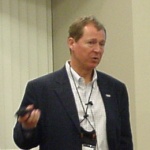
|
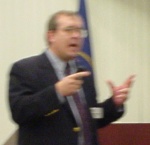
|
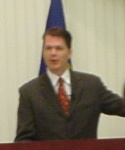
|
| Eric Olafson | Brent Israelson | Jeff Smith |
Next up is Cerberian, an Internet filtering solution for homes, businesses, and schools. The President and CEO is Jeff Smith. Cerberian doesn't sell directly, but works through 21 OEM partners including SonicWall, Computer Associates, Broadcom, Zone Labs, and Belkin. Cerberian is a hosted solution. They host the database and filtering servers and thin client enables the blocking.
The fifth company is netdocuments. The President and CEO is Ken Duncan. The company sells solutions to law firms like Dorsey and Whitney, real estate companies like Kelty Trust, and financial services companies. ScanSoft integrates netdocuments software in the their scanning products. One of their markets is litigation support; they are an outsourced provider of document management for trial work. I haven't heard enough to tell me how they would contrast themselves with NextPage.
The next company is MyFamily.com. Tom Stockham is the President and CEO. MyFamily.com is one of the largest subscription business on the net. Family history is big on the Internet and MyFamily.com takes advantage of that. MyFamily.com has 30 million registered users and over 900,000 people pay a monthly subscription. This leads to real revenue growth. Subscription revenue is nearly doubling year over year. I wonder if their is a significant blogging presence in family history? If seems like a natural for genealogists to narrate their work to form communities in ways that you can't with just news groups or message boards.
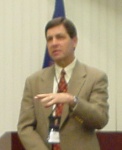
|
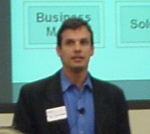
|
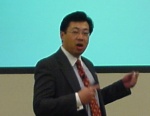
|
| Ken Duncan | Tom Stockham | Jim Kuo |
The seventh company is MediConnect. The President and CEO is Michael Colemere. MediConnect is a medical record retrieval firm that does work for insurance and legal companies. These companies pay over $6 billion per year to retrieve and maintain medical records. MediConnect essentially acts as an agent for these companies. They have a call center that will call a doctors office, retrieve the information, scan it and deliver it electronically to the requester. Their competitors are using fax machines to do the same thing.
BioMicro Systems is an inventor of microfluidic biochip technologies that can be used in research tools, diagnostic devices, and consumer products. James Kuo is the President and CEO. BioMicro's product automates the sequencing preparation steps in genetics work, reducing the manual tasks from 11 to 4. They have been used by Myriad Genetics where they reduced reagents costs by $6M/year. They create the chips using an excimer laser to cut microfluid channels and wells into a doped plastic. The process and resulting product are protected by over 16 patents.
Salus Therapeutics has technologies for discovering, developing, and delivering of nucleic acid-based medicines. Dr. Richard Koehn is the President and CEO. Their technology, chemistry based, allows these genetic therapies to be directed at specific genes. The presentation has quickly dropped into a level of biochemistry and genetics that my high-school biology is not equipped me for. I wonder how everyone else in the room is doing.
Last up is GenData, a non-proofit organization that was created by the State incorporation with the University of Utah and Huntsman Cancer Institute to exploit the genetic data and records available in some very large, extensive and well-documented families in Utah. Michael Paul is the Chief Operating Officer. At its heart, GenData is a marriage between biotech and IT in that they're mostly about managing data. You might wonder why a non-profit is The English Bio-Bank is a similar effort in Britain. GenData combines family histories, clinical data, and genetic data to provide a set of data for genetic research.
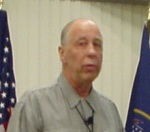
|
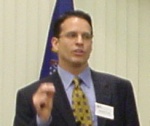
|

|
| Richard Koehn | Michael Paul | Darren Lee |
Overall, this morning was a great event and showed off some great Utah high-tech companies in a very good light.




